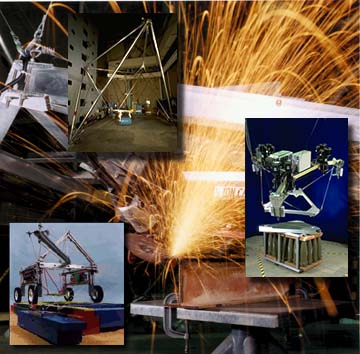 |
| Robo crane. Source Wikipedia Commons
Unlike Germany, the
international leader in high value manufacturing, the United States does not
have a national manufacturing policy. Nor does the Commonwealth of
Massachusetts have a well-defined manufacturing policy and direction.
However, in western Massachusetts, a strategy to support precision
manufacturing has been developed through a partnership of the Hampden County
Regional Employment Board (REB), Springfield Technical Community College and
Holyoke Community College, vocational and comprehensive high schools, the
University of Massachusetts/Amherst and, most importantly, area precision
manufacturers organized via the Western Massachusetts Machining and Tooling
Association. This partnership has garnered state support to:
1) Bring
together key constituents to assess the needs of area manufacturers and plan
joint actions.
2) Quantify the need and skill level for new
employees;
3) Employ, through a pilot project, a shared
engineer to assist small manufacturing enterprises (SMEs) to develop new products;
4) Expand education and training of both
incumbent and new employees.
Based on these
experiences and drawing on research and the work of others, new group the Massachusetts Center for Advanced Design and Manufacturing (MCADM) has been established to advance
manufacturing throughout the state by analyzing roadblocks, developing plans
and implementing solutions. MCADM’s goal will help the Commonwealth
develop statewide policies to support the expansion of manufacturing, much as
is being done nationally in Germany. To assist manufacturing, MCADM is using an inside out model, that is, starting with the
experiences in western Massachusetts and other regions of the state, a
statewide approach will be developed. If successful, this statewide
initiative may stimulate other states to make similar efforts, leading
eventually, one would hope, to a national manufacturing policy, leadership and
advocacy.
Following the Preview of the MIT Production in the Innovative Economy (PIE) report, three challenges must be overcome to sustain and expand
manufacturing in Massachusetts:
1) Training: expanding
the number of trained employees including entry production workers, technicians
and engineers. While not in the MIT study, Alan Robinson, Professor at
the Eisenberg School of Business, argues that training for manufacturing
managers in lean and other modern techniques is also needed. As a first
step, MCADM should obtain data to determine the manufacturing employment
and training needs in the Commonwealth.
2) Technology transfer:
Creating better linkages to diffuse new technology to new or existing
companies. In past decades, large manufacturing companies (OEMs)
maintained their own research laboratories, developing new products that were
then manufactured. In the US, these companies have shed much of this
capacity that now resides in university and specialized research
laboratories. The challenge is to facilitate the movement of this
research into new products especially within small manufacturing enterprises (SMEs). A local
industrialist cites the related issue of preparing for the next wave of manufacturing
change, the smart factory or factory 4.0 that will be highly automated and
flexible, able to make efficiently make small batches of sophisticated
products.
3) Financing: The MIT study
identified this as the third critical issue: “Today, when innovation is more
likely to emerge in small spinoffs or out of university or government labs,
where do the scale-up resources come from? How available is the funding needed
at each of the critical stages of scale-up: prototyping, pilot production,
demonstration and test, early manufacturing, full-scale
commercialization?”
|
Sunday, December 15, 2013
THREE ISSUES FOR MCDAM
Subscribe to:
Post Comments (Atom)


No comments:
Post a Comment